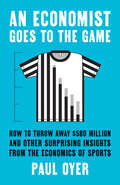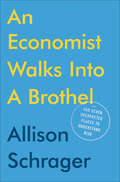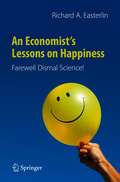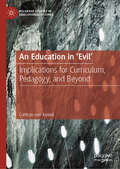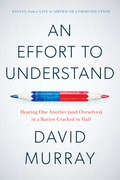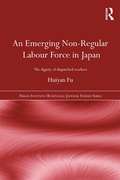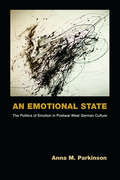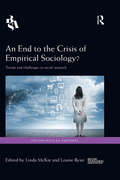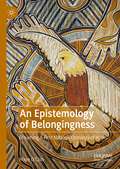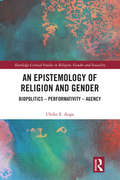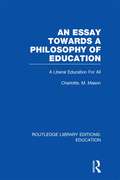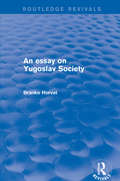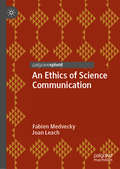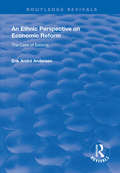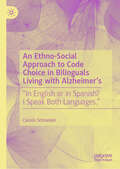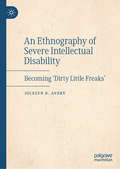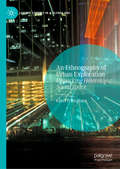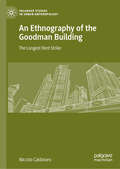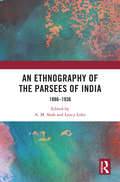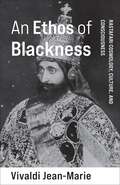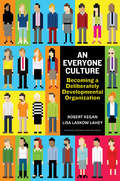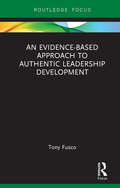- Table View
- List View
An Economist Goes to the Game: How to Throw Away $580 Million and Other Surprising Insights from the Economics of Sports
by Paul OyerAn engaging look at the ways economic thinking can help us understand how sports work both on and off the field Are ticket scalpers good for teams? Should parents push their kids to excel at sports? Why do Koreans dominate women’s golf, while Kenyans and Ethiopians dominate marathon racing? Why would Michael Jordan, the greatest player in basketball, pass to Steve Kerr for the game-winning shot? Paul Oyer shows the many ways economics permeates the world of sports. His topics range from the business of sport to how great athletes use economic thinking to outsmart their opponents to why the world's greatest sports powerhouse (at least per capita) is not America or China but the principality of Liechtenstein. Economics explains why some sports cannot stop the use of performance-enhancing drugs while others can, why hundred-million-dollar player contracts are guaranteed in baseball but not in football, how one man was able to set the world of sports betting on its ear—and why it will probably never happen again. This book is an entertaining guide to how a bit of economics can make you a better athlete and a more informed fan.
An Economist Walks into a Brothel: And Other Unexpected Places to Understand Risk
by Allison SchragerIs it worth swimming in shark-infested waters to surf a 50-foot, career-record wave?Is it riskier to make an action movie or a horror movie?Should sex workers forfeit 50 percent of their income for added security or take a chance and keep the extra money?Most people wouldn't expect an economist to have an answer to these questions--or to other questions of daily life, such as who to date or how early to leave for the airport. But those people haven't met Allison Schrager, an economist and award-winning journalist who has spent her career examining how people manage risk in their lives and careers. Whether we realize it or not, we all take risks large and small every day. Even the most cautious among us cannot opt out--the question is always which risks to take, not whether to take them at all. What most of us don't know is how to measure those risks and maximize the chances of getting what we want out of life.In An Economist Walks into a Brothel, Schrager equips readers with five principles for dealing with risk, principles used by some of the world's most interesting risk takers. For instance, she interviews a professional poker player about how to stay rational when the stakes are high, a paparazzo in Manhattan about how to spot different kinds of risk, horse breeders in Kentucky about how to diversify risk and minimize losses, and a war general who led troops in Iraq about how to prepare for what we don't see coming.When you start to look at risky decisions through Schrager's new framework, you can increase the upside to any situation and better mitigate the downsides.
An Economist’s Lessons on Happiness: Farewell Dismal Science!
by Richard A. EasterlinOnce called the “dismal science,” economics now offers prescriptions for improving people’s happiness. In this book Richard Easterlin, the “father of happiness economics,” draws on a half-century of his own research and that conducted by fellow economists and psychologists to answer in plain language questions like: Can happiness be measured? Will more money make me happier? What about finding a partner? Getting married? Having a baby? More exercise? Does religion help? Who is happier—women or men, young or old, rich or poor? How does happiness change as we go through different stages of life? Public policy is also in the mix: Can the government increase people’s happiness? Should the government increase their happiness? Which countries are the happiest and why? Does a country need to be rich to be happy? Does economic growth improve the human lot? Some of the answers are surprising (no, more money won’t do the trick; neither will economic growth; babies are a mixed blessing!), but they are all based on reason and well-vetted evidence from the fields of economics and psychology. In closing, Easterlin traces the genesis of the ongoing “Happiness Revolution” and considers its implications for people’s lives down the road.
An Ed-Tech Tragedy?: Educational Technologies and School Closures in the Time of COVID-19
by Mark WestThe COVID-19 pandemic pushed education from schools to educational technologies at a pace and scale with no historical precedent. For hundreds of millions of students, formal learning became fully dependent on technology – whether internet-connected digital devices, televisions or radios.An Ed-Tech Tragedy? examines the numerous adverse and unintended consequences of the shift to ed-tech. It documents how technology-first solutions left a global majority of learners behind and details the many ways education was diminished even when technology was available and worked as intended.Using tragedy as a metaphor and borrowing the organization of a three-act theatrical play, the book shows how technology-first modes of learning introduced novel health and safety risks, handed significant control of public education to for-profit companies, expanded invasive digital surveillance and carried detrimental environmental repercussions, in addition to adversely impacting educational access, equity, quality and outcomes in most contexts.Dedicated sections consider alternative and less technology-reliant educational responses to COVID-19 disruptions that had the potential to be more inclusive and equitable. The analysis further explains how pandemic models of learning are rippling beyond school closures and influencing the future of education.Holistically, the work invites readers to reconsider a turbulent chapter in education history and reexamine the purposes and roles of technology in education.
An Education in 'Evil': Implications for Curriculum, Pedagogy, and Beyond (Palgrave Studies in Educational Futures)
by Cathryn van KesselThis book asserts that engaging with divergent understandings about the nature of evil and how it functions can help those interested in education think through issues in curriculum, pedagogy, and beyond. The author provokes thinking about and through the concept of evil in the spirit of thoughtful education (as opposed to thoughtless schooling) toward how we might live together in less harmful ways. Although thinking about evil can be uncomfortable and troubling, such inquiries help us explore what sort of relations we want to have with others. Analyzing our role in evil as humans, as well as our responsibilities to counter the processes of evil present in our everyday lives, opens up a potential to foster radical thought in and out of the classroom.
An Effort To Understand: Hearing One Another (and Ourselves) in a Nation Cracked in Half
by David MurrayWhat we say, what we don't, and why it matters.This new collection of essays from rhetoric authority and celebrated writing blogger David Murray applies his signature blend of humor and heart to a free-wheeling conversation about how we communicate in America.With essays like "We Deserve Leaders Who Act Like They Like Us," and "Speaking Truth to Power: Talking to Myself," Murray's words give readers a window into everyday American discourse—from the backroads of rural Illinois to the carpeted halls of the C-suite.Guided by an ear for the lessons of history, An Effort to Understand shows that the personal and political gulfs between us are small compared to our common desire to connect.American discord is nothing new, but we have a chance at trust, peace, and solidarity if we make an effort to speak more honestly and listen to understand.
An Emerging Non-Regular Labour Force in Japan: The Dignity of Dispatched Workers (Nissan Institute/Routledge Japanese Studies)
by Huiyan FuLike many industrialised nations, the current employment trend in Japan centres on diversification of the labour market with an increased use of temporary labour. Among a wide range of non-regular labour arrangements, haken are a newly legalised category of non-regular workers who are typically employed by the employment agency while working at the facilities of and being under the authority of the client firm. They have recently expanded exponentially under the state’s deregulation policy and assumed considerable significance in political debate, especially with regard to the nation’s ‘widening gaps’ known as kakusa. This is the first anthropological study of haken and temporary agency work (TAW) in Japan which combines both macro- and micro level analyses. At the macro level, haken are explored from a historical perspective with a view to showing the changing state policy and public perception of haken. At the micro level, how TAW is experienced by real people in concrete situations is extremely varied and complex, often depending on intersecting structural variables including gender, age and class. The book therefore provides insight into the gap between powerful discourses and everyday life, as well as a better understanding of personhood in Japan’s shifting landscape of employment. This book will be of interest to students and scholars of Japanese Studies, Japanese Business, Asian Business and Asian Anthropology.
An Emotional State: The Politics Of Emotion In Postwar West German Culture
by Anna M. ParkinsonThis literary-historical study seeks to dismantle the prevailing notion that Germany, in the period following the Second World War, exhibited an "inability to mourn," arguing that in fact the period experienced a surge of affect. Anna Parkinson examines the emotions explicitly manifested or addressed in a variety of German cultural artifacts, while also identifying previously unacknowledged (and under-theorized) affective structures implicitly at work during the country's national crisis. Much of the scholarship in the expanding field of affect theory distrusts Freudian psychoanalysis, which does not differentiate between emotion and affect. One of the book's major contributions is that it offers an analytical distinction between emotion and affect, finding a compelling way to talk about affect and emotion that is informed by affect theory but that integrates psychoanalysis. The study draws on the psychoanalytic writings of Freud, Margarete and Alexander Mitscherlich, and André Green, while engaging with interdisciplinary theorists of affect including Barbara Rosenwein, Lauren Berlant, Ann Cvetkovich, and Eve Kosofsky Sedgwick, among many others.
An Encyclopedic Dictionary of Women in Early American Films: 1895-1930
by Denise LoweExamine women&’s contributions to film-in front of the camera and behind it! An Encyclopedic Dictionary of Women in Early American Films: 1895-1930 is an A-to-Z reference guide (illustrated with over 150 hard-to-find photographs!) that dispels the myth that men dominated the film industry during its formative years. Denise Lowe, author of Women and American Television: An Encyclopedia, presents a rich collection that profiles many of the women who were crucial to the development of cinema as an industry-and as an art form. Whether working behind the scenes as producers or publicists, behind the cameras as writers, directors, or editors, or in front of the lens as flappers, vamps, or serial queens, hundreds of women made profound and lasting contributions to the evolution of the motion picture production. An Encyclopedic Dictionary of Women in Early American Films: 1895-1930 gives you immediate access to the histories of many of the women who pioneered the early days of cinema-on screen and off. The book chronicles the well-known figures of the era, such as Alice Guy, Mary Pickford, and Francis Marion but gives equal billing to those who worked in anonymity as the industry moved from the silent era into the age of sound. Their individual stories of professional success and failure, artistic struggle and strife, and personal triumph and tragedy fill in the plot points missing from the complete saga of Hollywood&’s beginnings. Pioneers of the motion picture business found in An Encyclopedic Dictionary of Women in Early American Films include: Dorothy Arnzer, the first woman to join the Directors Guild of America and the only female director to make a successful transition from silent films to sound Jane Murfin, playwright and screenwriter who became supervisor of motion pictures at RKO Studios Gene Gauntier, the actress and scenarist whose adaptation of Ben Hur for the Kalem Film Company led to a landmark copyright infringement case Theda Bara, whose on-screen popularity virtually built Fox Studios before typecasting and overexposure destroyed her career Madame Sul-Te-Wan, née Nellie Conley, the first African-American actor or actress to sign a film contract and be a featured performer Dorothy Davenport, who parlayed the publicity surrounding her actor-husband&’s drug-related death into a career as a producer of social reform melodramas Lois Weber, a street-corner evangelist who became one of the best-known and highest-paid directors in Hollywood Lina Basquette, the "Screen Tragedy Girl" who married and divorced studio mogul Sam Warner, led The Hollywood Aristocrats Orchestra, claimed to have been a spy for the American Office of Strategic Services during World War II, and became a renowned dog expert in her later years and many more! An Encyclopedic Dictionary of Women in Early American Films: 1895-1930 also includes comprehensive appendices of the WAMPAS Baby Stars, the silent stars remembered in the Graumann Chinese Theater Forecourt of the Stars and those immortalized on the Hollywood Walk of Stars. The book is invaluable as a resource for researchers, librarians, academics working in film, popular culture, and women&’s history, and to anyone interested either professionally or casually in the early days of Hollywood and the motion picture industry.
An End to the Crisis of Empirical Sociology?: Trends and Challenges in Social Research (Sociological Futures)
by Louise Ryan Linda McKieResearch data are everywhere. In our everyday interactions, through social media, credit cards and even public transport, we generate and use data. The challenge for sociologists is how to collect, analyse and make best use of these vast arrays of information. The chapters in this book address these challenges using varied perspectives and approaches: The economics of big data and measuring the trajectories of recently arrived communities Social media and social research Researching 'elites', social class and 'race' across space and place Innovations in qualitative research and use of extended case studies Developing mixed method approaches and social network analysis Feminist quantitative methodology Teaching quantitative methods The book provides up to date and accessible material of interest to diverse audiences, including students and teachers of research design and methods, as well as policy analysis and social media.
An Epistemology of Belongingness: Dreaming A First Nation’s Ontology of Hope
by Hope O'ChinThe intent of this book focuses on Australia’s First Nations truth, voice, recognition, diversity, and respect. Hope O’Chin explains that knowledge about Australian First Nations culture and learning can be seen through new conceptual lens, which she refers to as an Ontology of Dreaming Hope for Australians. The book proposes to move from ontological propositions embedded in pedagogies and methodologies that center on the relevance of Indigenous epistemes and ways of doing. O’Chin offers a conceptual framing for engaging with Indigenous peoples, and forming communities of belongingness and relationality. She offers suggestions for ways in which art and education can act as ‘healing’ and a way forward towards a more inclusive civil society. Reflexive practice, ethnographic principles, and action research is described in a way that methodologies provide an understanding of a sense of Belonging. O'Chin argues that theoretical research, art, and educational practice can addto the value of determining a strategy of Indigenous art investment within Australia, and to address how art and education can be used to validate contemporary expression of Aboriginality within contemporary Australian society. Ultimately, the book is about Indigenous strengths and what Indigenous ways of being, knowing and doing can offer, and how one might go about honouring and working in this way respectfully.
An Epistemology of Religion and Gender: Biopolitics, Performativity and Agency (Routledge Critical Studies in Religion, Gender and Sexuality)
by Ulrike E. AugaThis book puts forward a new epistemological framework for a theory of religion and gender’s role in the public sphere. It provides a sophisticated understanding of gender and its relation to religion as a primarily performative category of knowledge production, rooting that understanding in case studies from around the world. Gender and religion are examined alongside biopolitics and the influence of capitalism, neoliberalism and empire. The book analyses the interdependence of religion, gender and new nationalisms in the Palestinian territories, South Africa and the USA, scrutinising the biopolitical interferences of nation states and dominant political and religious institutions. It then moves on to uncover counter-discourses and spaces of activism and agency in contexts such as East Germany and the Occupy Wall Street movement. Using gender, queer and trans theory in tandem with postcolonial and post-secular perspectives, readers are shown a more nuanced understanding of critical contemporary questions related to religion, gender and sexuality. This is a bold new take on religion, gender and public life. As such, it will be of keen interest to scholars of Religious Studies and Gender Studies, as well as those working on religion’s interaction with Politics, Sociology and Social Activism.
An Essay Towards A Philosophy of Education: A Liberal Education for All (Routledge Library Editions: Education)
by Charlotte M MasonThis was the last and most important and comprehensive work of Charlotte Mason, (founder of the Parents’ National Educational Union). For more than half a century the practical results of her original thought on education could be seen in all parts of the world in the Charlotte Mason Method and the Parents’ Union Schools.
An Essay on Yugoslav Society
by Branko HorvatThis title was first published in 1967. In the foreword the author states that the present Essay was not written in haste, and probably cannot be read through in haste either. It is the result of my thinking about our society for the last sixteen years. The section "The Transition Period" was written and published as long ago as 1951 ; the last section, on the theory of the party, was written only after the Brioni Plenum of the Central Committee of the Communist Party of Yugoslavia, when study of these problems had become socially relevant, in the sense of the quotation of Marx that has been adopted as the epigraph of this book. Part of the text has been published in Ekonomist, Pregled, Gledüta and Na&e teme. Part I and Chapters 11 and 14 are taken from my book Towards a Theory of Planned Economy.
An Ethics of Science Communication
by Fabien Medvecky Joan LeachThis book presents the first comprehensive set of principles for an ethics of science communication. We all want to communicate science ethically, but how do we do so? What does being ethical when communicating science even mean? The authors argue that ethical reasoning is essential training for science communicators. The book provides an overview of the relationship between values, science, and communication. Ethical problems are examined to consider how to create an ethics of science communication. These issues range from the timing of communication, narratives, accuracy and persuasion, to funding and the client-public tension. The book offers a tailor-made ethics of science communication based on principlism. Case studies are used to demonstrate how this tailor-made ethics can be applied in practice.
An Ethnic Perspective on Economic Reform: Case of Estonia (Routledge Revivals)
by Erik Andre AndersenFirst published in 1999, this book has its main emphasis on the consequences of privatisation for the Russian population in Estonia, The Book will attempt to answer the following questions by comparing the Estonians and the Russians.The process of restoration of the Republic of Estonia (which began to move fast in the late 1980’s and culminated with the declaration of national independence in 1991) is seen as an important political factor behind the economic reform in Estonia. This reform during the transition period is generally considered to be among the most successful in eastern Europe.
An Ethno-Social Approach to Code Choice in Bilinguals Living with Alzheimer’s: “In English or in Spanish? I Speak Both Languages.”
by Carolin SchneiderThis book examines the under-researched field of communication by bilingual people with dementia of the Alzheimer's type (DAT). The aging population is increasingly affected by neurocognitive diseases such as DAT, and over the past 30 years, the growing research body concerned with monolingual DAT discourses has seen significant growth. The findings from monolingual studies and institutional settings highlight the importance of code choice for a person’s sense of autonomy, especially against the background of changing communicational abilities. Adding a new perspective, this book investigates how ten Puerto Rican speakers living with varying stages of DAT draw on their bilingual resources to accomplish verbal interaction in informal settings with their primary care partners. Drawing on narrative interviews conducted in Orlando, Florida, this multi-case study investigates situated language choices and code-switches by applying the ethno-social approach, i.e. combining features of conversation analysis and ethnography of communication. The author sheds light both on the question of how people living with DAT engage in conversations and which strategies they employ in their languages (English and Spanish) to reach their communicative goals. Specifically, by analyzing the role of code choice and code-switching in a qualitative manner, two main functional categories emerge: discourse-related and participant-related code-switching. Bilingual competencies remain even among participants living with severe DAT symptoms, as evident in retained interactional sequences such as salutations. Persons living with DAT competently negotiate code, either through exploratory code-switching or metalinguistic commentary, emphasizing the need for conversational partners to be sensitive to the communicative needs, in both languages, of speakers living with DAT. This book will be of interest to students and researchers working on dementia discourses, health communication, multilingualism and ageing, as well as Bilingual/ Multilingual families or individuals living with dementia.
An Ethnography of Severe Intellectual Disability: Becoming 'Dirty Little Freaks'
by Jocelyn D. AveryIn this ethnographic investigation of a special education needs college in Australia, Jocelyn D. Avery explores how the self-identity of people with severe intellectual identities is influenced by carers and support people in their lives. Employing theoretical foundations of self-identity and embodiment and drawing largely on Mary Douglas’s (1996) notions of ritual and hygiene, purity and danger, Avery argues that students in this environment are treated as though they exist in a vacuum, rather than a highly complex social environment: strategies to ‘contain’ their difficult selves ultimately lead to continued confinement, as if the students themselves were ‘contaminated’. In the midst of this much-needed ethnography, Avery meditates on her own role: matters of consent, communication, and cooperation pose a challenge to anthropological engagement with severe intellectual disability, but researcher ethics and positionality have their own difficulties. The reflection provided here will provide a guide for future researchers to sensitively engage with people with disability.
An Ethnography of Urban Exploration: Unpacking Heterotopic Social Space (Leisure Studies in a Global Era)
by Kevin P. BinghamThis book analyses a unique leisure world that has been built around a newly emerging phenomenon known as urban exploration; the art of exploring human-made environments which are generally abandoned or hidden from sight of the public eye. Drawing on Michel Foucault’s concept of heterotopia, Bingham provides a detailed and critical investigation of urban exploration as a form of leisure that is about the coming together of drifting performers who, in their celebration of ‘rebellion’ and ‘deviance’, are determined to find a sense of meaning and belonging. The research considers the influence of consumer capitalism on urban explorers, and the wider social, economic and political context that shapes ideas of belonging and identity in the twenty-first century. By doing this, the book analyses urban exploration as an activity that has emerged in a time when human ideas about culture, individuality and community have transformed, and ‘solid’ modernity is gradually disintegrating around us. This multi and interdisciplinary work will appeal to people with an interest in ‘abnormal’ or ‘deviant’ leisure, as well as academics from sociology, anthropology, social geography, leisure studies, cultural studies, sport and recreation and tourism.
An Ethnography of the Goodman Building: The Longest Rent Strike (Palgrave Studies in Urban Anthropology)
by Niccolo Caldararo“An Ethnography of the Goodman Building vividly incorporates a wide variety of methods to tell the story of class struggle in a building, neighborhood, and city that is replicated globally. I read it as a number of boxes inside each other opened in the course of reading. Caldararo recounts the building’s personal “biography” to convey not only the “facts about,” but the “feelings about” the flesh and blood of the building and its surrounding neighborhood.” —Jerome Krase, Brooklyn College of The City University of New York, USA “This unique contribution to the field of urban and regional studies counteracts current trends in the ethnographies of urban movements by offering, with great hindsight, an analysis from a physical space, and from first-hand experience. The focal point is one building, and the author is a former tenant. This perspective is appealing, especially in an era of global connections where macro social movements are on the front line of urban life and research.” —Nathalie Boucher, Director and Researcher, Respire, and Affiliated Professor Assistant, Department of Sociology and Anthropology, Concordia University, Canada.Through in-depth analysis and narrative investigation of an actual building occupation, Niccolo Caldararo seeks to not only offer an historical account of the Goodman Building in San Francisco, but also focus on the active resistance tactics of its residents from the 1960s to the 1980s. Taking as its focal point the building itself, the volume weaves in and out of every life involved and the struggles that surround it—San Francisco’s urban renewal, ethnic clearing, gentrification, and municipal governance at a time of booming urban growth. Caldararo, a tenant at the center of its strikes and activities, provides a unique perspective that counteracts current trends in ethnographies of urban movements by grounding its analysis in physical and tangible space.
An Ethnography of the Parsees of India: 1886–1936
by A. M. Shah and Lancy LoboThis volume explores a wide spectrum of Parsee culture and society derived through essays from the Journal of Anthropological Society of Bombay (1886–1936). This journal documents intensive scholarship on the Parsee community by eminent anthropologists, Indologists, orientalogists, historians, linguists, and administrators in the late 18th and early 19th centuries. Comprising 0.05% of India’s total population today, the Parsees (now spelled “Parsis”) have made significant contributions to modern India. Through contributions of Jivanji Jamshedji Modi, Bomanjee Byramjee Patell, and Rustamji Munshi, eminent Parsee scholars, the essays in this book discuss the social and cultural frameworks which constitute various key phases in the Parsee life nearly 100 years ago. They also focus on themes such as birth, childhood and initiation, marriage, and death. The volume also features works on Parsee folklore and oral literature. An important contribution to Parsi culture and living, this book will be of great interest to scholars and researchers of sociology, social anthropology, ethnography, cultural studies, history, and South Asia studies.
An Ethos of Blackness: Rastafari Cosmology, Culture, and Consciousness (Black Lives in the Diaspora: Past / Present / Future)
by Vivaldi Jean-MarieRastafari is an Afrocentric social and religious movement that emerged among Afro-Jamaican communities in the 1930s and has many adherents in the Caribbean and worldwide today. This book is a groundbreaking account of Rastafari, demonstrating that it provides a normative conception of Blackness for people of African descent that resists Eurocentric and colonial ideas.Vivaldi Jean-Marie examines Rastafari’s core beliefs and practices, arguing that they constitute a distinctively Black system of norms and values—at once an ethos and a cosmology. He traces Rastafari’s origins in enslaved people’s strategies of resistance, Jamaican Revivalism, and Garveyism, showing how it incorporates ancestral religious traditions and emancipatory politics. An Ethos of Blackness draws out the significance of practices such as avoiding technological exploitation of natural artifacts and the belief in living in harmony with the natural order. Jean-Marie considers Rastafari’s theology, exploring its reinterpretation of biblical scriptures and its foundations in the rejection of Christianity’s Eurocentrism and racism. However, he insists, before Rastafari can fulfill its promise of liberation for people of African descent, it must confront its failure to include women and redress sexism.Through rigorous and sensitive reflections on Rastafari culture and cosmology, this book offers deeply original insights into the Black theological imagination.
An Everyday Life of the English Working Class
by Carolyn SteedmanThis book concerns two men, a stockingmaker and a magistrate, who both lived in a small English village at the turn of the nineteenth century. It focuses on Joseph Woolley the stockingmaker, on his way of seeing and writing the world around him, and on the activities of magistrate Sir Gervase Clifton, administering justice from his country house Clifton Hall. Using Woolley's voluminous diaries and Clifton's magistrate records, Carolyn Steedman gives us a unique and fascinating account of working-class living and loving, and getting and spending. Through Woolley and his thoughts on reading and drinking, sex, the law and social relations, she challenges traditional accounts which she argues have overstated the importance of work to the working man's understanding of himself, as a creature of time, place and society. She shows instead that, for men like Woolley, law and fiction were just as critical as work in framing everyday life.
An Everyone Culture: Becoming a Deliberately Developmental Organization
by Deborah Helsing Lisa Laskow Lahey Robert Kegan Andy Fleming Matthew L MillerA Radical New Model for Unleashing Your Company's PotentialIn most organizations nearly everyone is doing a second job no one is paying them for-namely, covering their weaknesses, trying to look their best, and managing other people's impressions of them. There may be no greater waste of a company's resources. The ultimate cost: neither the organization nor its people are able to realize their full potential. What if a company did everything in its power to create a culture in which everyone-not just select "high potentials"-could overcome their own internal barriers to change and use errors and vulnerabilities as prime opportunities for personal and company growth?Robert Kegan and Lisa Lahey (and their collaborators) have found and studied such companies-Deliberately Developmental Organizations. A DDO is organized around the simple but radical conviction that organizations will best prosper when they are more deeply aligned with people's strongest motive, which is to grow. This means going beyond consigning "people development" to high-potential programs, executive coaching, or once-a-year off-sites. It means fashioning an organizational culture in which support of people's development is woven into the daily fabric of working life and the company's regular operations, daily routines, and conversations.An Everyone Culture dives deep into the worlds of three leading companies that embody this breakthrough approach. It reveals the design principles, concrete practices, and underlying science at the heart of DDOs-from their disciplined approach to giving feedback, to how they use meetings, to the distinctive way that managers and leaders define their roles. The authors then show readers how to build this developmental culture in their own organizations.This book demonstrates a whole new way of being at work. It suggests that the culture you create is your strategy-and that the key to success is developing everyone.
An Evidence-based Approach to Authentic Leadership Development (Routledge Focus on Mental Health)
by Tony FuscoThis book presents the first evidence-based approach to Authentic Leadership Development. It is based on a group-coaching format that brings together small groups of leaders to discuss personally significant leadership issues generally not explored in usual leadership development, such as the influence of their personal histories, the impact of their psychological make-up, and the ambitions for their future leadership. The book starts with an overview of the idea of authenticity and its philosophical roots, and explains how this informs the past/present/future group-coaching approach to Authentic Leadership Development. It presents statistical and conceptual evidence of the program’s efficacy and explores how the social processes at work within the group positively impact and develop the leader’s self-concept and the benefits this brings. Importantly, it also details exactly how the leader changes and grows as a result of the group-coaching, and the positive ways in which this benefits their leadership role and the organisations they work in. Finally, it questions the notion of ethics and morals in Authentic Leadership and critically re-appraises the idea of leadership development evaluation. Authentic Leadership Development group-coaching has been shown to develop leaders that are conscious, competent, confident and congruent and as the qualitative analysis presented in the book illustrates, these 4 over-arching categories are made up of 7 further key leadership attributes that are developed, which include an enhanced Strategic Orientation, increased Confidence and Clarity and greater Management Mindfulness, among others. The book also features personal vignettes throughout, which illustrate how individual leaders have effectively applied these newly developed attributes in their leadership roles. An Evidence-based Approach to Authentic Leadership Development represents essential reading for leaders who want to engage in a ‘proven’ form of ALD. It will be of great interest to professionals across a variety of industries who have responsibility to provide robust leadership development programs for their organisations, as well as coaches specialising in executive, business and leadership coaching and those interested in new applications for group coaching.
